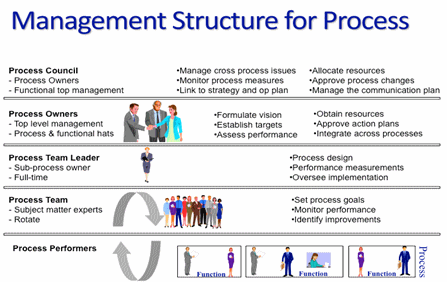One of the end goals of any process-based effort (BPM, LSS, CPI, PBM, etc) should be instilling process thinking throughout the organization – But how do you do it? A key to developing a process-based organization is identifying and implementing a management structure that promotes and supports your process efforts.
Process roles in this management structure are one of the fundamental components that need to be addressed as an organization moves along the journey to becoming process-based. Without these roles in place, the chances of sustaining ongoing process success will be limited.
This chart provides some detail on each of the roles:

Each role evolves as the organization moves from managing individual processes to actually continuously improving and managing the organization’s portfolio of processes on an ongoing basis. We will address the evolution of roles in future articles.
We get insight into what organizations are actually doing in practice through the results of Process Strategy Group’s Quick Assessment. We tabulated the responses from all participants who have completed the free Quick Assessment on the question: “Our Management Structure for Process includes:”
Responses (as shown in the results chart below) indicate that:
Without specific roles in place, any activity would need to be a part of someone’s day job, which means not much process work is occurring. Start by forming process teams to understand and improve specific processes.
Where would your organization fit into the chart below?


















